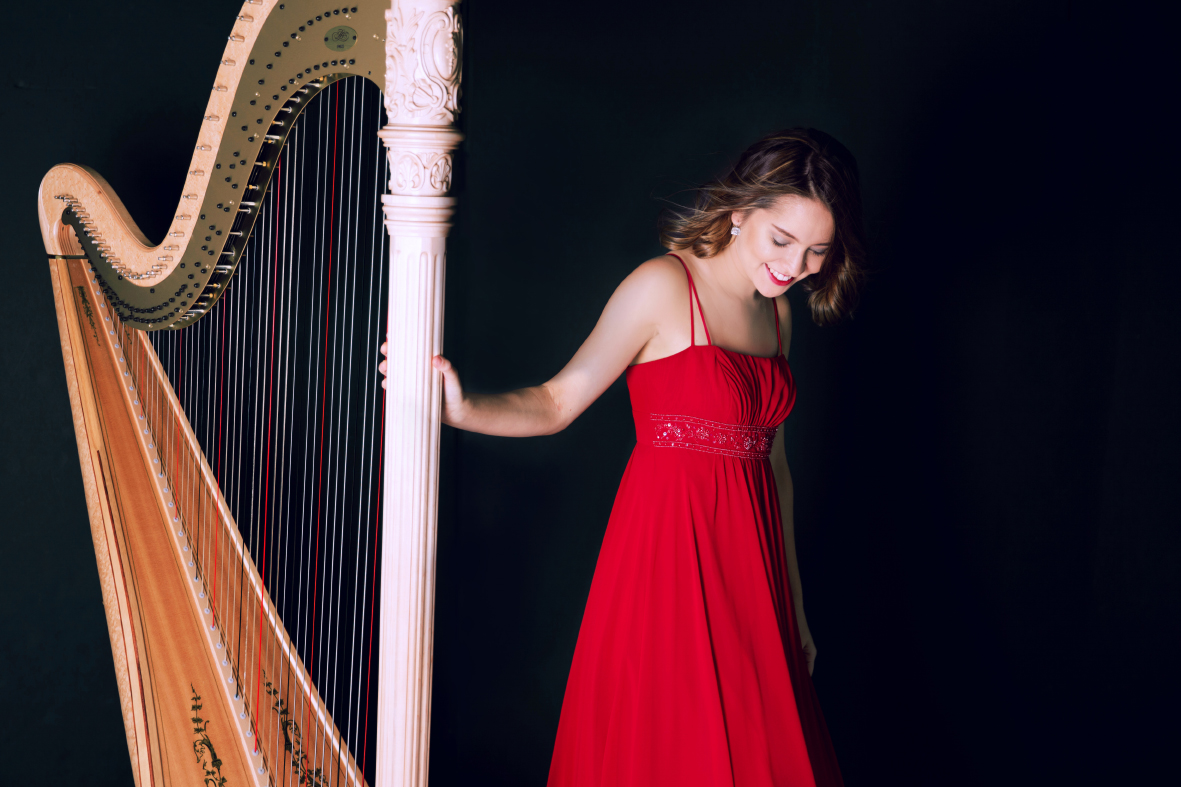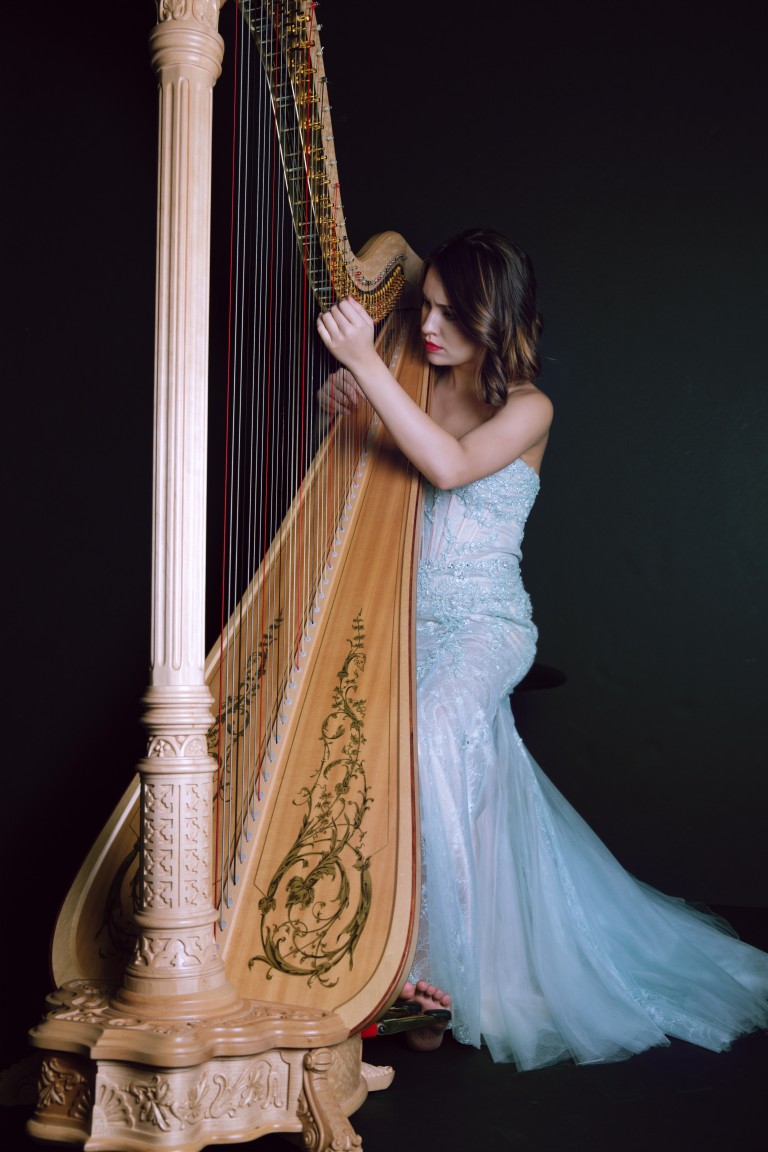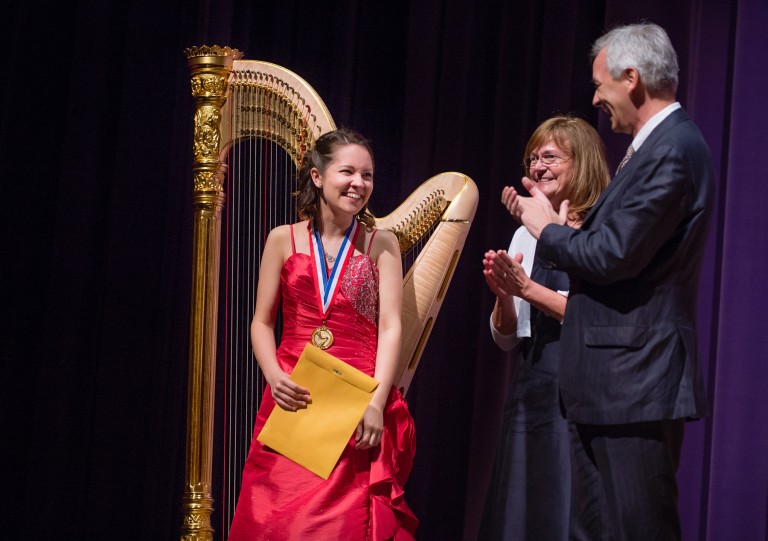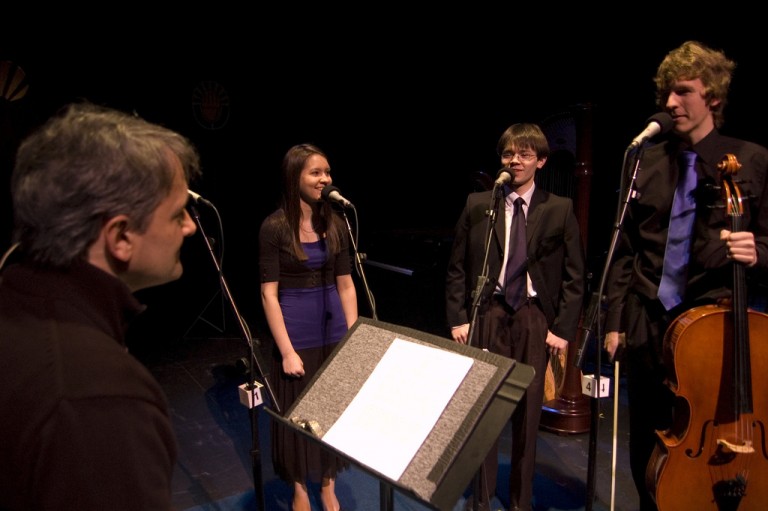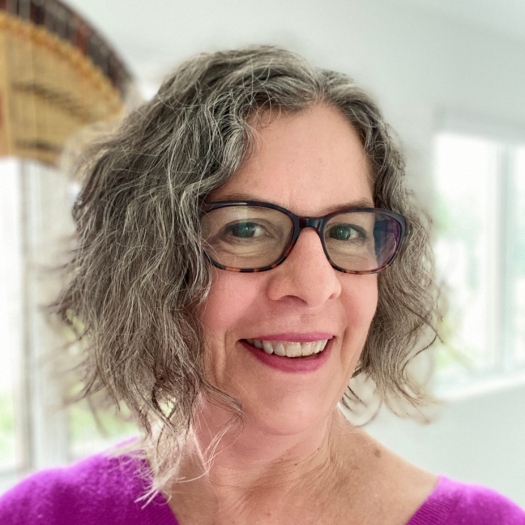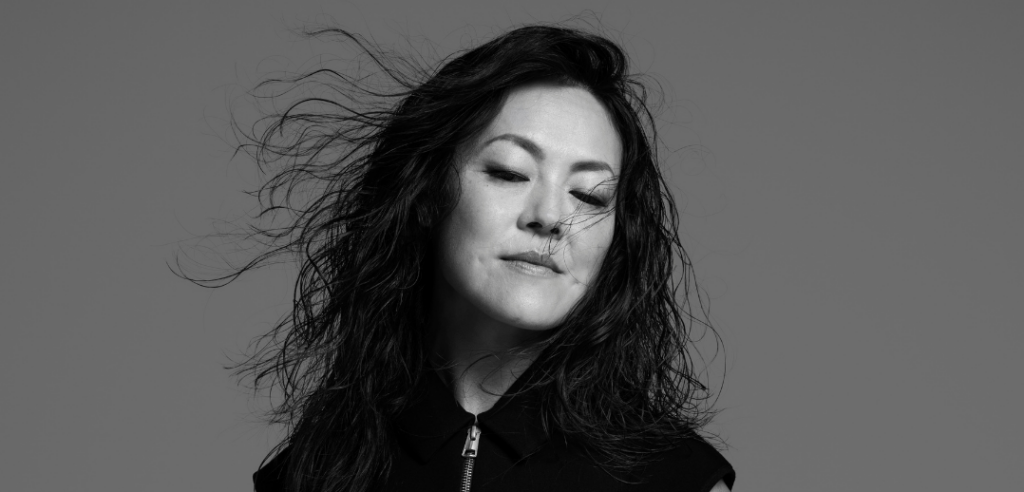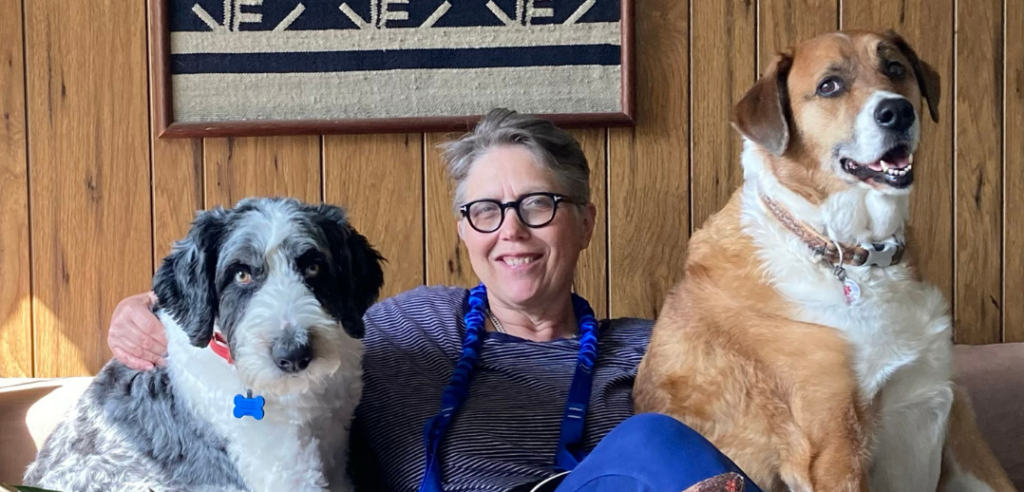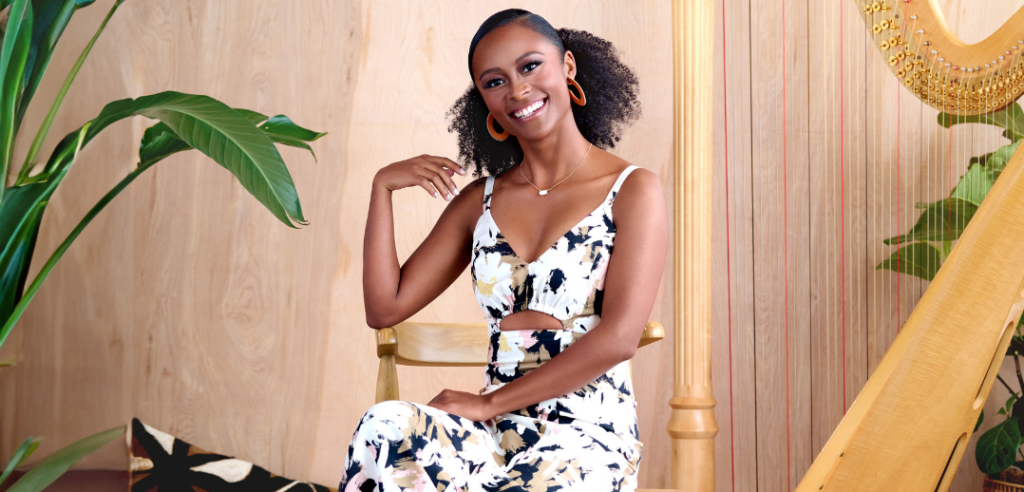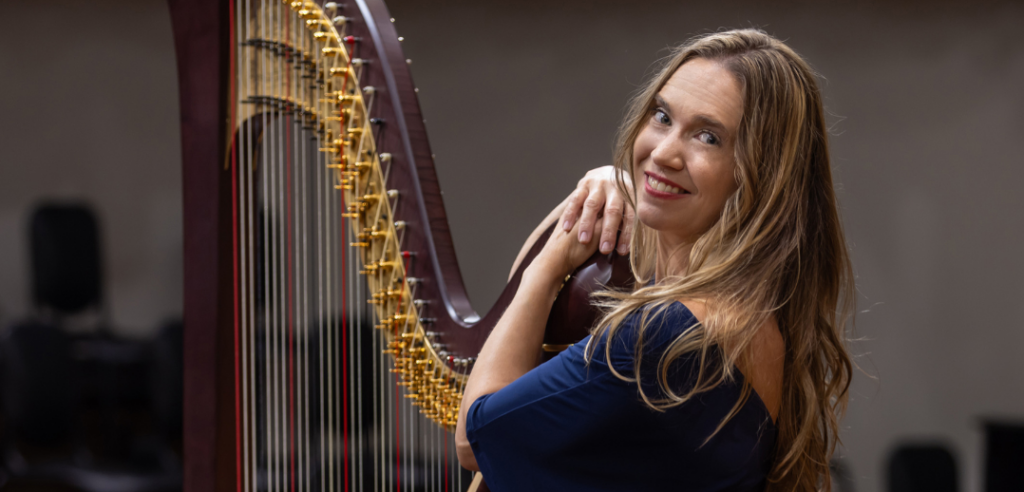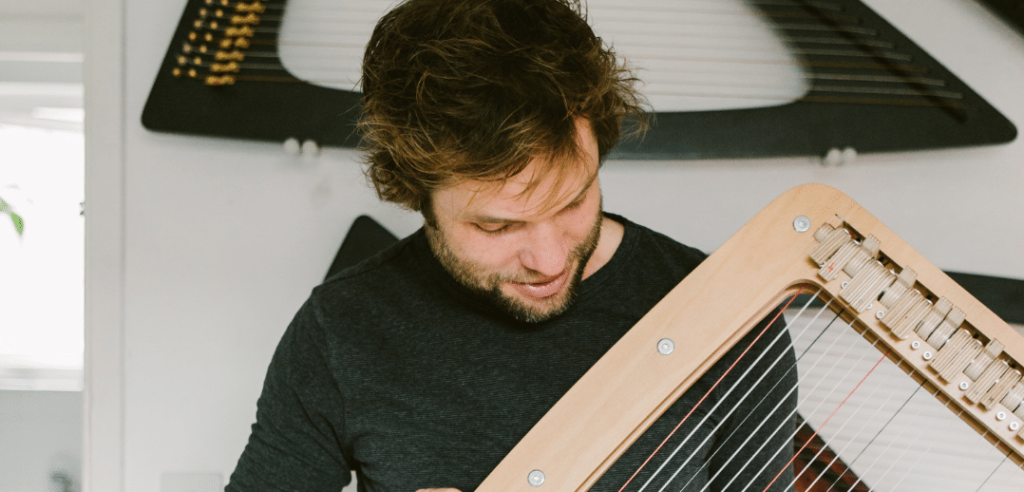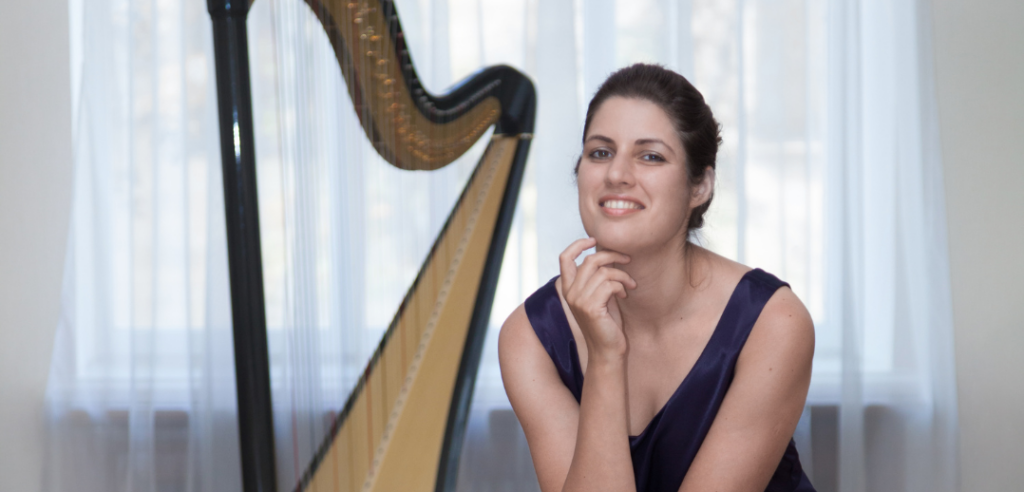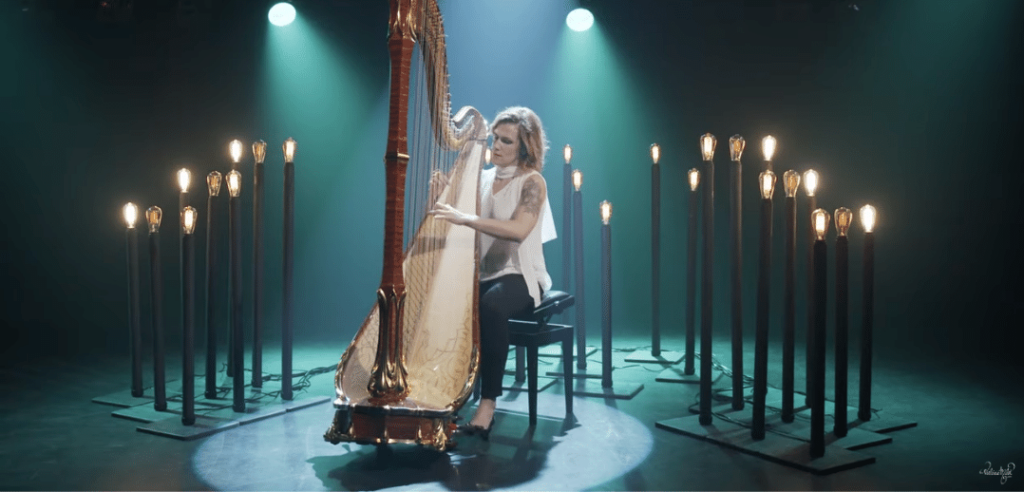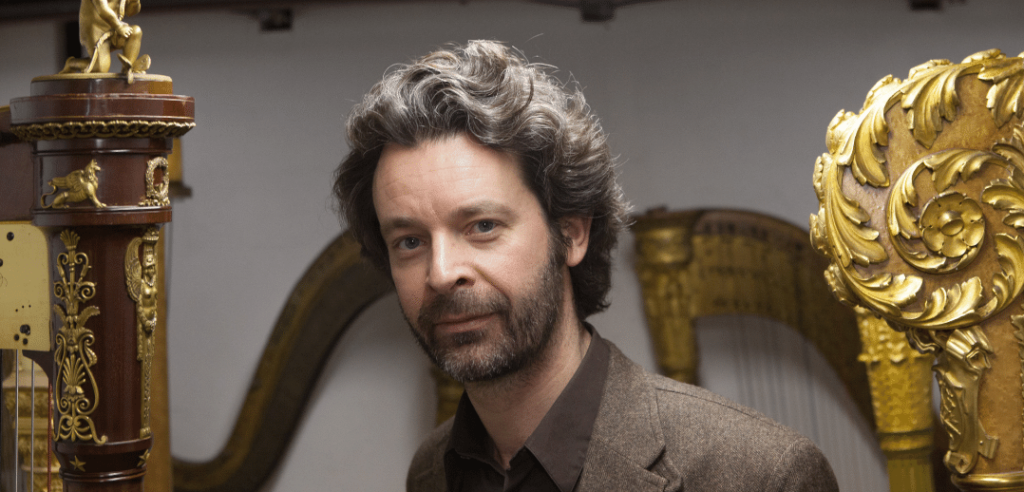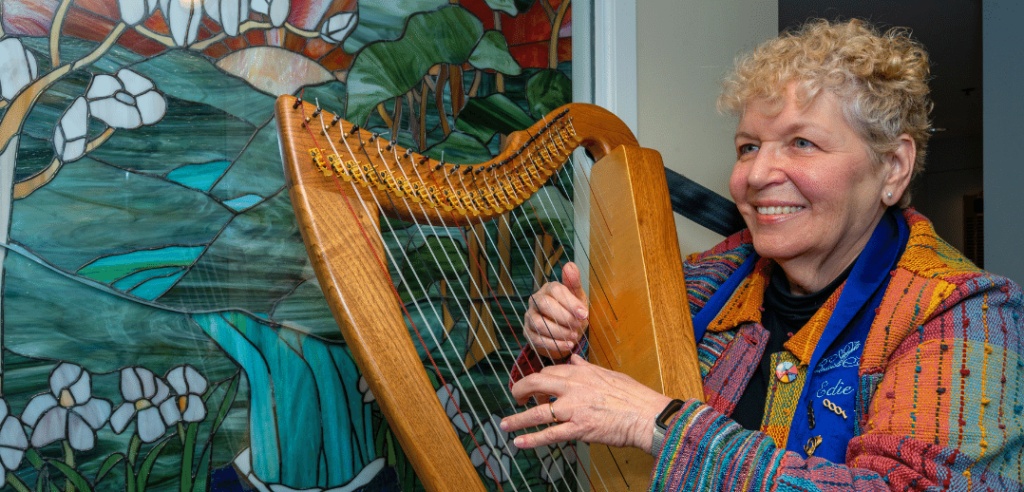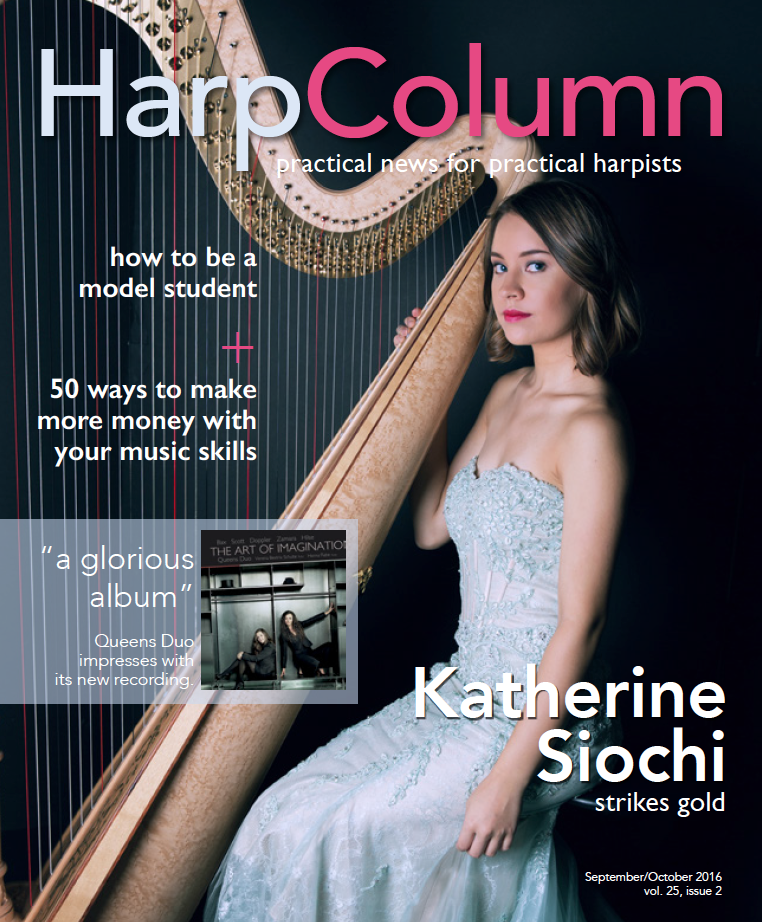“I don’t think I’ve ever practiced that intensely for that many days all at once, and by the day of the finals, my arms and hands were really sore,” says Siochi of her marathon 10 days at the International Harp Competition. It all paid off as Siochi took home the gold, becoming the first American winner of the competition since 1989.
I confess: I was rooting for Katherine Siochi all along. As one of the editors at Harp Column I know I shouldn’t play favorites, but having known and worked with Katherine since she was 12, I couldn’t help but think to myself as I watched the live stream of the USA International Harp Competition in July, “Yes! I want her to win it!” And she did. Siochi had some stiff competition to take home the gold medal this year. Silver medalist Elizabeth Bass and bronze medalist Lenka Petrovic gave outstanding performances as well, and the judges certainly had their proverbial work cut out for them. But there can be only one first place winner, and as Katherine is the first to humbly point out, “luck always plays a role to a certain extent.” I caught up with her at the American Harp Society Conference in Atlanta to find out more about the competition, how she prepared, and how she became the lucky Golden Girl.
Harp Column: We are just a couple weeks removed from your win at the USA International Harp Competition. Bravo!
Katherine Siochi: Thank you!
HC: What was the first thing that went through your head when you won?
KS: Honestly I can’t really remember. My brain kind of just froze, and I don’t think I really processed it for a while—definitely not that whole evening! [Laughs] I’m still processing even now, so I don’t know!
HC: Fair enough! What was the moment you knew winning was within your grasp during the competition?
KS: After I played my third stage, I felt pretty confident with how that round had gone, and I was really happy with it. So when I found out that I had advanced to finals, I definitely had a better idea that it was possible. But before stage three I didn’t really think it was going to happen because I didn’t even think I’d advance to stage two, necessarily, since only 20 people out of 40 pass. So after the third round, I knew it was a little more possible, but I was very nervous for the final stage because the concerto was definitely my least prepared piece.
HC: But at least you knew it! [Laughs]
KS: I knew it, but I hadn’t really been practicing it during the course of the competition since I didn’t really think I’d need to play it. During those two days in between the third and final stage, I was super nervous since I felt like it was a little more out of my control. The other pieces were all solo pieces, and I had been able to arrange a lot of opportunities to perform them on different recitals, but the [final stage] concerto I had never even played with a pianist or anything. So that was my first time playing with any kind of accompaniment.
HC: Wow!
KS: The day I got to Bloomington, I actually bought a pocket [orchestral] score of the concerto, and I’m really glad I did. I thought, maybe I’ll want this later. I probably won’t need it, but I’ll get it just to be safe. [Laughs] So I had that score and studied it a lot and listened to a bunch of different peoples’ recordings. I knew all the different entrances and timing really well, so that helped a little bit.
HC: Now, for people who weren’t at the competition, the final stage is not the first time you played with the orchestra. You get a rehearsal with them, right?
KS: Right, the day after the stage three results were announced, we had a conductor and pianist rehearsal. Then the day after that, we had a rehearsal with the orchestra, and then on the day of the final, we had a dress rehearsal. We had two rehearsals with the full orchestra and one with piano.
HC: I was actually able to catch your performance on the live stream. That was amazing!
KS: It’s really great that they did that because some of my family who weren’t able to be there were still able to watch it. My parents, brother, grandparents, aunt, former and current harp teachers all traveled to Indiana to hear me perform in the final round! My family and teachers were unbelievably encouraging throughout the competition. Their love and support was really touching and overwhelming. I’m grateful and humbled to have had so many loved ones there cheering me on.
HC: Did the thought of the live stream go through your mind when you were playing, like “It’s not just the people in front of me…”
KS: I wasn’t thinking about it at all. Actually, I made a point with each round to smile in the direction of the audience but not to look closely at the audience because I didn’t want to be able to tell how many people were there since that would have probably made me much more nervous, if I saw how full the auditorium was. [Laughs] So I was fine.
HC: When did you start preparing for this competition?
KS: I think they released the [repertoire] list two summers ago, and I started shortly after that. I started Scintillation, one of the first-stage pieces and one other piece. Then just every few months I would start another piece and add them on.
HC: At what point would you say you had all of the repertoire mastered?
KS: Well, the Ginastera [Concerto] I didn’t really have mastered until a couple weeks before I went to Bloomington! [Laughs] That one I sort of left till the end. But the rest, I would say, I was able to play through all of them decently in March, so about three months before the competition.
HC: Was there ever a point in that process that you thought you couldn’t finish, that you couldn’t do it, or that you questioned yourself?
KS: That’s a good question. It just seemed so far out, even when it was only a month or two away, just because it had been something that I had been preparing for so long. I kept thinking that it was so far out that it seemed like I had a lot of time, even though I didn’t. I never really felt overwhelmed in terms of learning [the repertoire] just because I did start so early, and I had tried to pace the learning process.
HC: How did you stay motivated? I mean, in case people aren’t familiar, it’s four rounds of music, did you ever time how many hours worth of material it was?
KS: I think I timed mine and it was at least two hours and 20 minutes of music.
HC: So how did you stay motivated to keep that at a high level for two years?
KS: It was definitely hard, especially with the first-stage pieces that I had been playing for so long. I started to get a little bit sick of them. But when I would get tired of a piece—like the one that I definitely felt comfortable with—I would just put it away for maybe a month. Then I would come back to it, and hopefully it wouldn’t be so tiresome. I think over-practicing can lead, in my case, to a less organic-sounding performance. It can sound more like you’re just playing it by rote. But it was hard to stay motivated. My practicing would go in spurts. Some days I just really wouldn’t want to do it, and then other days I would do several hours, so it just depended on my mood.
HC: What was the most difficult aspect of this competition?
KS: The hardest part of the competition for me was actually the physical fatigue from practicing so much, 10 days in a row. I don’t think I’ve ever practiced that intensely for that many days all at once, and by the day of the finals my arms and hands were really sore! Also, the mental fatigue, by the end of the competition, was very tough for me. It was tough to have the emotional stamina to keep performing at a high level under high pressure.
HC: I’ve known you for a long time, since you were a student at my summer program the Young Artist’s Harp Seminar. I remember you when you came to us, I think you were 12. And I think that you may have been the biggest perfectionist student that I’ve come across in my entire teaching career.
KS: [Laughs]
HC: Given that I know what a perfectionist you are, did you play to the standard you wanted to play?
KS: That’s a good question. When I was 12, I definitely valued certain things more than I do now, in terms of all of the aspects that go into a performance. I was very happy with all of my performances at the competition, but not because of perfection. I did play fairly accurately, but I was just happy with each piece I played. I felt I represented its character well and captured what was important about each specific piece.
HC: So you don’t think that you are the same kind of perfectionist that you were when you were younger?
KS: No, I think I more value phrasing, expression, doing something unique over accuracy. Not that I don’t value accuracy, but I would rather listen to a performance that I think has character or really conveys just what the composer is trying to express in a piece over a note-perfect performance that doesn’t say anything unique. Technique and accuracy are things that I prepare for in the practice room, but when I’m out there performing, I feel like they are somewhat out of my control. The work I’ve put in for note-accuracy has already been done, and I feel like luck always plays a role to a certain extent. What I can control during a performance is my expressiveness, sensitivity, the direction of phrases, and stage presence. Perfection is something I strive for during practice, but if that’s my focus in a performance it’s detrimental to really creating music.
HC: I’m going to ask you a cliché question, but you know, I think everybody is curious to know what goes through your head when you’re playing? What do you think about in the heat of a competition?
KS: It was really interesting because normally when I perform I get very nervous and my hands shake a lot because my heart rate is really up, so I’m just thinking, “Oh no! My hands need to stop shaking!” But for some reason that didn’t happen to me in any of the four rounds of this competition. The only thing I can really think of that I did differently was, five to 10 minutes before going out on stage, if I could hear other people playing, I would put headphones on so that I wasn’t listening to them, so they wouldn’t distract me. Then I would just take really slow, deep breaths in and out to try and lower my heart rate, and I think that actually really helped! So then when I was out there [on stage], I was just trying to follow the lines of music and figure out how I could play everything in a way that showed true engagement with the music. For example in the Carnival of Venice, I think it is a really humorous piece, but a lot of people just think of it as a technical exercise. So I remember when I was out there playing it, I was trying to think about how each phrase would relate to the next one because there is a lot of call and response stuff. I was trying to be almost spontaneous with thinking of it as different characters interacting with each other. I was surprisingly much less nervous than I usually am when I perform and less distracted than I usually am, because normally when I perform my mind kind of trails off and I’m not thinking of the music that much.
HC: Is that a skill that you worked on in advance of this competition?
KS: Not really. I think it kind of just happened. [Laughs]
HC: You’re a student at Juilliard, and you’re the American Harp Society Concert Artist, so obviously you have a lot of experience performing at a high level. What do you think was the most important thing in your harp training that helped you prepare for this competition?
KS: Performing these pieces a lot was super helpful. I became comfortable with doing that because I had many recitals through the AHS Concert Artist program, and I tried to mix and match the competition pieces over the few months before the competition. Also, my piano training helped. I began as a pianist before I started learning the harp, and during my undergraduate [studies] I continued to study piano for those four years. My piano teacher at Juilliard always emphasized the importance of voicing. As a result, it’s something I learned to be very conscious of in my harp playing as well, to know what musical lines are most important and how lines interact with each other. It adds so much interest to a piece, and I think listeners can really notice an added dimension to the music.
HC: What was your favorite piece?
KS: Of the pieces they required, I really liked Scintillation. But the pieces that I liked the most were all the ones I picked in the free choice round! [Laughs]
HC: What was your least favorite piece?
KS: I guess it was probably the Dussek Sonata just because I thought the first few times I heard it, wow, what a remarkably uninteresting piece, such boring writing. But then when I performed it, I tried to be really attentive to the phrasing and to carry it to the ends of the lines.
HC: That was going to be my next question. How do you play something at a high level if you don’t like it, which might be the case at a competition?
KS: Fortunately, I pretty much liked all the pieces except for that one, so I just tried to give it some character and to have fun with it.
HC: We should talk a little bit about the contemporary harp piece, Sublimation, which happened to be written by your brother Jeremiah! What a coincidence was that?
KS: We definitely weren’t expecting him to win. He wrote the piece in his senior year of college, and I didn’t end up learning it until the year after that so I could perform it in my Juilliard undergraduate recital in May 2015. Since he had already written it, I just encouraged him to enter his score [in the 2015 USA International Harp Competition Composition Contest], and then I had to make the recording for it in November. And then this January, he found out he won, and we were really surprised! I thought maybe he had a chance, because the idea he came up with was so unique, but I assumed he wouldn’t win because usually they pick pieces that are not as tonal or not as easy to grasp—for lack of a better word—weird. [Laughs] It’s really jazzy and has this fun groove. The notes aren’t all over the place, and it’s a little bit easier to grasp, so I thought maybe that would prevent him from winning. But apparently they really liked it, and in the composers forum during the competition, they interviewed him, and they showed some of the comments that some of the judges of the composition contest had written about it, and one of them said, it’s good because it presents a rhythmic challenge for the harpist, something not all harpists can do! [Laughs]
HC: I’m not sure I agree with that!
KS: I know, I was like, that’s kind of funny! But I guess they ended up focusing on the rhythm because it’s such an integral part of the piece. That’s why they said that. It’s all based on that rhythmic pattern.
HC: So you got a lot of prizes as a result of winning this competition. You got a new harp and you got performance packages. What aspect of the prizes are you the most excited about?
KS: Well, the harp I haven’t actually gotten yet because I get to go and pick it out in Chicago, so that’s exciting! I’ll get to try pretty much any harp I want. It’ll be exciting to get to choose. But I’m really excited about the tour in China next summer. It’s a solo recital in five different cities in China. I’ve definitely never performed internationally on the harp, so I’m really looking forward to that—being able to play for so many different audiences and being able to see China!
HC: What advice do you have for young harpists who want to compete? What would you tell somebody who is going to enter this competition the next time?
KS: If you’re interested in competing, definitely get the list as soon as possible and make a plan, decide which pieces on the list you’re most excited about learning or suit you the best, and get started on them as early as you can and perform them as much as you can once you’ve learned them. Also, and this might be too cliché, but when you’re performing for a jury, try not to think about what the jury might like or about what style of playing they would prefer; just play in a way that you feel really represents who you are as a person. Try to really show your personality. More than whether or not they agree with your choices, I think judges most value being able to see that the music you’re creating is truly your own—that it’s your genuine expression and not just a rehashing of other people’s interpretations or what others have told you to do.
HC: What’s next for you now that you have this feather in your hat?
KS: Hopefully it will open up more performance opportunities. I’m still in school for another year finishing my master’s, so I haven’t really thought about what happens after I graduate.
HC: Could you see yourself having an orchestra job?
KS: I could, but I would love it if I could keep playing solo music too. I don’t know how realistic that is because the two things are very different, and I enjoy both for different reasons. But I don’t know if I would be happy doing only one or the other, so I don’t know! [Laughs] •






